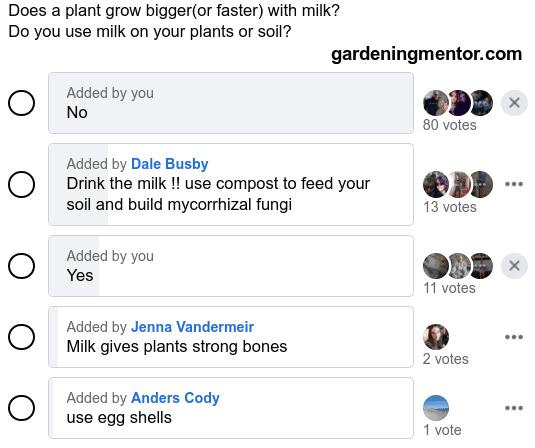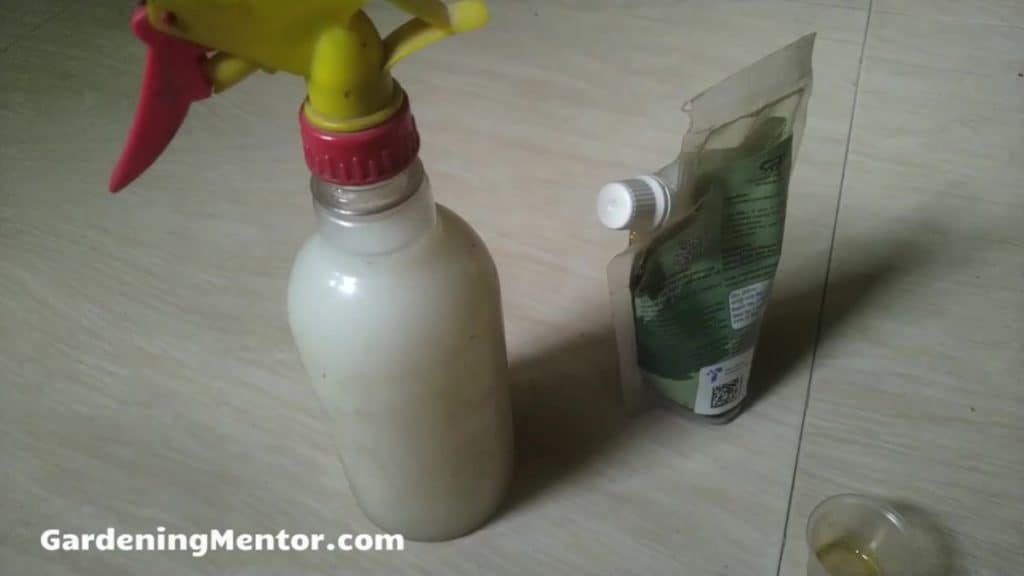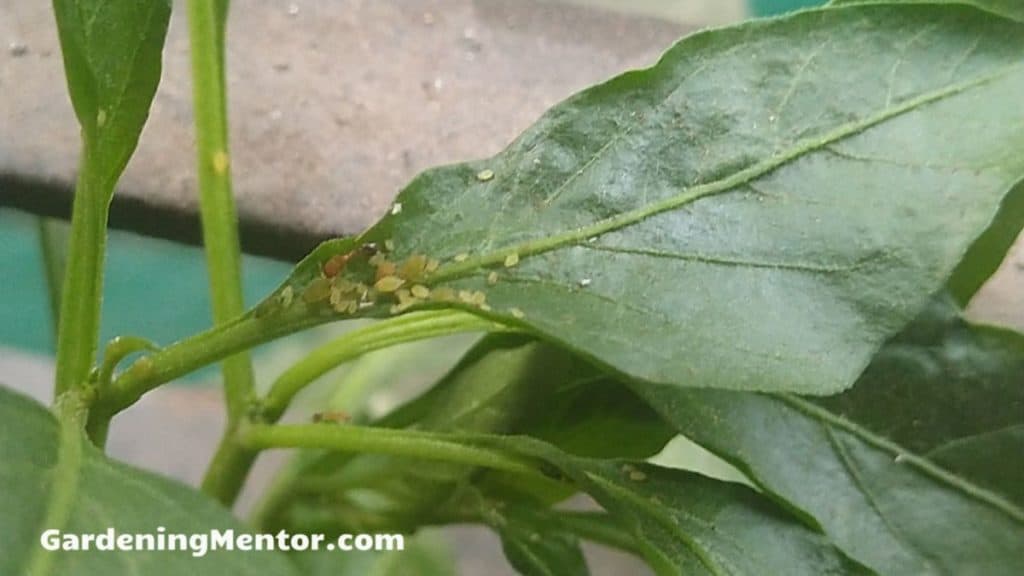It’s nutritious for you.
But does milk work the same way for your plants?
Plant does not grow bigger with milk. It does not have all the required micro and macro nutrients to give a huge growth boost. Milk does contain nutrients including protein and calcium so expired milk can be added to soil or compost instead of throwing it away.
In this post, I’ll help you understand why milk does not make plants grow bigger or faster. I’ll provide tips on how to use milk to provide calcium to the plant. And use milk to clear powdery mildew off the plant.
Let’s begin.
Can milk make plants grow faster?
To see whether milk will make an effective fertilizer, we need to look at its ingredients. Usually, this means looking at the NPK factor. This stands for Nitrogen, Phosphorous, and Potassium.
In these areas, milk is pretty limited. It’s estimated that milk contains just 0.5 percent nitrogen. But it does have a few essential elements. Most specifically, it will contain high levels of proteins and Vitamin B.
However, milk is rich in another essential element, calcium. This plays a vital role for the plant. It will be used to make strong cell walls. This will help transport nutrients. It can also provide a physical barrier against diseases.
So, while milk might not help your plants grow any faster, it can still play a valuable role. You can use it to fend off calcium deficiency.
What are signs of calcium deficiency in plants?
Not all plants will require milk. You will see the best effects when you add it to plants that aren’t getting enough calcium. There are a few reasons why this might happen.
First, it can be caused by over-fertilization. Too much ammonium or potassium in the soil can make it harder for the roots to absorb calcium. Another potential cause is unusually high or low humidity.
Here are some of the warning signs you should be looking out for:
- Look at the younger leaves. This is where a calcium problem will first start to manifest. In this case, the leaves will appear to have stunted growth. This can give your plant a bushy appearance.
- Brown marks. Initially, these will appear as spots on the youngest branches around the edge of the leaf. However, over time they will start to spread closer to the center. This can also begin to turn the veins brown.
- Crinkled leaves. Sometimes, you might spot the leaves beginning to get crinkled or torn.
- Stunted growth. Finally, the development of the roots might be affected by the lack of calcium. Because of this, your plant might not grow as tall or strong.
Plants won’t grow bigger with milk, and they will not survive if they are just given milk, since milk contains fats and protein, which makes it difficult for the plant to absorb the water in it – which is what it really wants. The main benefit of using milk is that it can help fight against fungi and other types of diseases that could potentially kill your plants. Still, you shouldn’t use milk straight-up, you should dilute it with equal parts water so that the plant still gets proper nourishment. – Jeremy Yamaguchi, CEO, Lawn Love
I conducted a poll asking fellow gardeners if they think using milk helps plants grow bigger. Out of 107 people, 93 thought it’s not a good idea to use milk on your plants.

Does milk get rid of powdery mildew?
Milk can get rid of powdery mildew because it acts as an effective fungal herbicide when used in a diluted form. The chemicals in milk interact with sunlight to kill the fungus.
Powdery mildew is a common and harmful type of growth. It looks like a white powder has been sprinkled over the leaves of infected plants. As it gets worse, this powder will start to turn yellow and brown.
There are a few ways that you can treat this. You can prune back the plants and give them a little more space when planting. This ensures plenty of air circulates the plants, making it harder for the fungal spores to get established. You can also avoid planting in damp areas, as water can transport the fungus from one infected leaf to another.
There are a few ways that you can deal with this. You might want to use a fungicide. However, a rising number of people don’t want to use these harsh chemicals in their gardens. They are increasingly turning to natural options. Because of this, milk has become a popular option.
Scientists from the University of Connecticut did a study about the effectiveness of milk. They concluded that it was as effective as a fungal herbicide when used in a diluted concentrated. The ideal mix is 60 percent water and 40 percent milk.
They are still trying to investigate why this happened. However, it’s believed to be linked to free radicals in milk. When these chemicals interact with the sunlight, they kill the fungus.
Will milk damage plants?
Milk will damage plants if you use too much because the bacteria will make the leaves wilt and even rot. It will stunt the plant growth and even kill it if you use milk without diluting it with water.
There are also a few less severe side effects. It will also cause a slight smell in the garden. However, this will go away within a few days. Sometimes, the bacteria from the milk will coat your garden. This might make your garden look less appealing.
Because of these potentially severe side effects, you should monitor what happens when you start applying milk. In most cases, though, the benefits of using milk in the garden will outweigh any downsides.
I’ve done experiments on this and 100% white whole milk kills grass. Wouldn’t want to use it on my plants. Use crushed egg shells for the calcium. – Nadine
How to use milk on plant leaves?

Using milk as a fertilizer is a little more complex than pouring it on the plant. As we mentioned, using too much milk might hurt your plant over the long term. Because of this, you will need to be careful when you prepare the milk formula. Here are some of the tips you need to follow:
- Make a diluted mix. The first thing that you need to do is make a weak solution. As we mentioned, you’ll get the best results by using a 60:40 ratio. But if you don’t like the smell of milk, you can dilute it even further.
- Use low or no-fat options. One of the reasons why milk can cause problems is because of the high-fat content. Because of this, stick to low-fat options. Though you should try to avoid skim milk.
- Distribute with a spray bottle. You will need to distribute the spray throughout the garden using a spray bottle. This ensures that no plant gets too much milk. If you have a large garden, you can use a garden hose to help you spread the mixture around. You won’t need to spray too often. Once a week will be enough.
- Don’t use fertilizer or chemical spray. You should avoid using a chemical spray. This can kill the beneficial bacteria that were present in the milk.
- Wipe down plants. Finally, you should give the plants thirty minutes to absorb the milk. After this time, you should return and wipe down any milk that is left on the leaves.
Milk supplies potassium, phosphorus, zinc and other nutrients. I always dilute old milk and water with it. The lower the fat the higher the potassium. – Cheyney
Read more:
Can I use spoiled milk to water plants?
You should not use spoiled milk to water plants because it can attract pests. The spoiled milk contains fat granules that may stick to the roots and prevent them from absorbing moisture and nutrients.
The bigger problem, though, is that the spoiled milk will create a foul smell. This can last for a long time. Even diluting it won’t be able to get rid of this smell.
Spoiled milk contains many beneficial microorganisms and enzymes, so it’s best to add it to your compost pile.
Is chocolate milk good for plants?
Chocolate milk is not good for plants because it contains sugar and other ingredients including chocolate that are harmful to the plant. There can be additives that can damage plant roots. They may clog the soil so the roots are unable to absorb nutrients and moisture.
Chocolate milk contains sugar that will attract pests especially ants to your plants. The pests will damage the plants. And the ants may farm aphids on the plant leaves for feeding on the honeydew that aphids secrete.

Is almond milk good for plants?
Almond milk is good for plants because it can be used as a nutrient booster. It’s best to use unsweetened almond milk that is rich in calcium, potassium, sodium, and several vitamins. You should dilute the almond milk with water and spray it on the foliage to give plants a nutrient boost.

Fact Checked, Written, and Published by Kevin Rodrigues
Kevin is the founder of Gardening Mentor, a website that aims to teach people to grow their own food in a limited space. As a self-taught gardener, Kevin has spent several years growing plants and creating gardening content on the website. He is certified in Home Horticulture and Organic Gardening from Oregon State University. He has a Post Graduate Diploma in Horticulture and Landscape Gardening from Mumbai University.
Read more
